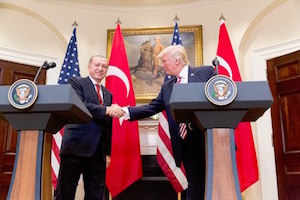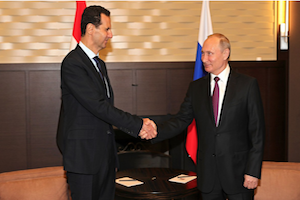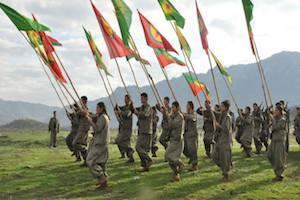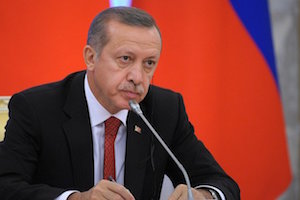The Kurdish "Other" and the American Enemy Ensure the Cohesion of Turkey's Nationalist Regime
By Cengiz Çandar
February 14, 2019
The perception of a Kurdish threat from Syria, abetted by the United States, has provided the Turkish regime with its raison d’être. It is the glue that holds the power coalition of a variety of ultranationalists together. As long as the regime of President Recep Tayyip Erdoğan relies on the Kurdish “other” for its internal cohesion – and ultimately for its survival – that imperative will continue to determine Turkish foreign policy. But Turkey’s strategic reorientation is also sustained by a long history of deep-seated suspicion of American motives. Indeed, Turkish-American relations were never harmonious and their history has taught the Turkish state elite not to trust the United States, and never before had so much been at stake as today.

The Adana Protocol Re-Emerges as Russia and Arab Nations Align Against Turkey's Syrian Intervention
By Micha’el Tanchum
January 24, 2019
The December 19, 2018 announcement of the withdrawal of American forces from northeastern Syria was heralded as Washington's concession to Turkey's President Recep Tayyip Erdoğan, giving him a green light for the eradication of the PKK-affiliated Kurdish forces of the People's Protection Units (YPG). However, Turkey's planned intervention to create a 'safe zone' in northern Syria east of the Euphrates river has been complicated by the recent reconciliation of key Arab nations with the regime of Bashar al-Assad to oppose Turkish ambitions. The Arab alignment with Russia's opposition to Turkey's intervention weakened Erdoğan's bargaining position in his January 23, 2019 meeting in Moscow with Russian President Vladimir Putin and may force Turkey to accept alternative arrangements for the safe zone based on the 1998 Adana Protocol between Ankara and Damascus.

Under Pressure, the PKK May Once Again Resort to Terrorism
By Matus Jevcak
September 24, 2018
The pressure of the Turkish security forces on the Kurdistan Workers’ Party (PKK) has been growing in recent months. After moving into the Kurdish enclave Afrin in Syria, Turkish forces have entered Northern Iraq and have advanced to the proximity of the PKK’s headquarters in the Kandil mountains. Turkey has vowed to continue its counter-terrorism operations against the PKK which might once again resort to a bombing campaign in Turkish cities in retaliation. A new round of PKK bombings would inevitably deepen the existing ethnic division in Turkey.

Momentum, Societal Militarization and Erdoğan's Forever Wars
By Gareth H. Jenkins
April 3, 2018
The conquest of Afrin in northwest Syria has boosted President Erdoğan’s popular support and raised expectations amongst his supporters at a time when they already believe that they are active participants in a sacred struggle. But, with Russia, Iran or the US expected to block any further attempts at major territorial acquisitions in Syria or Iraq, Erdoğan is running out of options and in danger of losing electoral momentum long before Turkey is due to go to the polls in November 2019.

Turkey is Expecting a Restart with the U.S.
By Halil Karaveli
January 23, 2017
The Kurdish question has, once again, complicated Turkish-American relations. The rhetoric of anti-Americanism remains useful to whip up and mobilize nationalist opinion. Yet, Erdoğan’s Islamists are not any aspiring anti-imperialists. What they want – and what they expect that Turkey is now going to get – is simply a better “business deal” with the United States under Donald Trump.



